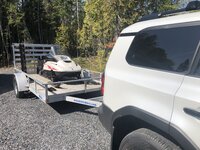We just bought our 2024 Land Cruiser (LC). We have never towed. Ever. Do we need multiple ball mounts? Multiple trailer balls? I’m also not seeing anything, cable wise, in my new LC. Wondering if they didn’t give me the wiring harness(?).
Someday we aspire to pull a trailer we have our eye on that weighs 3300 lbs dry weight. I believe it’s tongue weight is about 325 lbs.
Sorry for the newbie questions…
Someday we aspire to pull a trailer we have our eye on that weighs 3300 lbs dry weight. I believe it’s tongue weight is about 325 lbs.
Sorry for the newbie questions…


